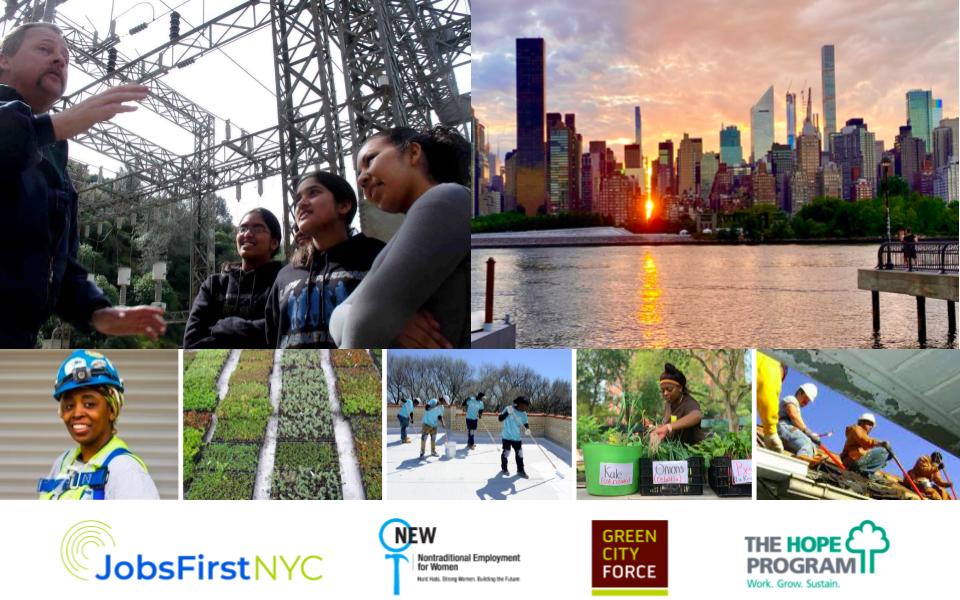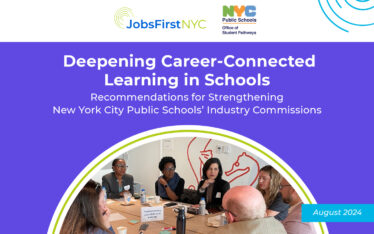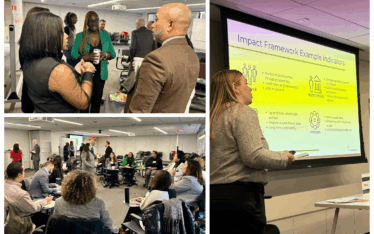Building an inclusive green economy in New York City requires understanding the knowledge and skills needed to most effectively execute sustainability, climate, resiliency and circular economy priorities, while also growing a sustainable pipeline of good jobs. As New York City and State implement plans for climate and equity, the time is now to build a community of practice and purpose among organizations and people working in this effort for equitable access to opportunities in the growing green economy.
Responding to the moment, JobsFirstNYC with partners Green City Force (GCF), The HOPE Program (HOPE), and Nontraditional Employment for Women (NEW) have hosted a series of green economy-focused convenings from September 2020 through January 2021, featuring conversations about New York State’s Green New Deal, New York City’s OneNYC, the opportunities and urgency related to sustainable and resilient buildings and communities, insights from frontline workers and employers, and the need for innovative cross-industry collaborations that center a more just recovery.
On September 24, 2020 Marjorie Parker, President and CEO of JobsFirstNYC, kicked off our Climate Week event Building an Inclusive Green Economy, the third installment in the 2020 year Adapting to the Future of Work: Transforming Systems to Advance Young Adult Economic Mobility online series. This event evolved out of ongoing conversations had by Kathleen Culhane, President of NEW, Jennifer Mitchell, Executive Director of HOPE. and Lisbeth Shepherd, Strategic Advisor at GCF, who approached JobsFirstNYC with a desire for an organized New York City green economy sector network – rooted in social, racial and economic justice – that could align workforce agencies delivering green jobs training with employers and policy makers focused on the growing green jobs sector.
Keynote speaker, Doreen Harris, Acting President and CEO of New York State Energy Research and Development Authority (NYSERDA), provided an overview of New York State’s position on climate legislation that rolled out the governors Green New Deal. NYSERDA leads the work for a green economy in New York State, with a $70 million investment in workforce development and a strategic focus on priority populations. Doreen highlighted that from NYSERDA’s perspective, “We see the clean energy industry being at the center of our ability to lead ourselves out of the economic recession, with a big focus on developing and training a workforce for jobs in clean energy sectors that will be critical for our economic recovery.”
In discussing what green jobs are and key considerations when developing an understanding about the green economy, Christopher Collins, Executive Director of Solar One, a prominent New York City environmental agency, recommended we look at three things when considering the state of the green economy: (1) policies and mandates enacted that encourage green economy growth; (2) the money — billions of dollars of investments have been committed by the government and private money is following suit; (3) the jobs and the plans (if any) that are in place to make sure Black and Brown people are included in training, hiring, and upskilling efforts. Greg Elcock, Director of Energy Efficiency and Demand Management, Con Edison, Ellie Kahn, Senior Policy Advisor, NYC Mayor’s Office of Sustainability, and Daphany Rose Sanchez, Executive Director, Kinetic Communities discussed demystifying and contextualizing what green jobs are, where opportunity lies within the sector, and mandates and strategies for more inclusive growth. Greg believes that inclusivity in the ConEd workforce is essential for their progress, “We see our mission as diversity and inclusion. Equally, we need every woman and man at ConEd to feel respected, included, and safe to speak up. We need their new ideas and different points of view. Diversity and inclusion is how we get there.”
Ellie and Daphany doubled down on Chris’s third point when Ellie first stated, “By investing in and fostering minority and women owned businesses, you’re inherently building more wealth in communities of color, you’re building more job opportunities for people who otherwise may not have had access to those pipelines.” Daphnay continued the conversation, stating, “Making sure you’re not ignoring the community — being more inclusive and asking what are the existing issues that [a community] has… that’s what is going to make us move forward… and hit [goals] in a way that is just for Black and Brown communities and low-income folks in the built environment and in other sectors of efficiency and energy.”
On the topic of environmental sustainability, inclusion and equity, keynote speaker Deputy Mayor J. Phillip Thompson, Deputy Mayor for Strategic Policy Initiatives for the City of New York, spoke in conversation with Donnel Baird, Founder and CEO of BlocPower. Deputy Mayor Thompson emphasized the necessity to invest in and strengthen the movement for green jobs and to elevate training and education, as well as describing the opportunity for ownership and wealth building to make the green economy more fair and equitable. The City is pushing for new legislation, the Community Hire Act, to ensure more community members benefit from incoming economic opportunity. Donnel, describing the inherent tension between energy efficiency in buildings and adhering to COVID-19 recommendations of opening windows, brings to the surface the need for workforce training to be responsive to new practices.
Deputy Mayor Thompson noted that, “We can leverage the buying power, and the contracting power of City and State government to literally eliminate poverty. And that is something the green jobs effort just makes visible for everybody – we can do this.”
In addressing solutions toward an equitable and inclusive green economy, Sideya Sherman, Executive Vice President, Community Engagement & Partnerships at the New York City Housing Authority (NYCHA), and Executive Director of the City’s Taskforce on Racial Inclusion and Equity, highlighted NYCHA’s sustainability agenda that includes new energy performance contracts, solar garden initiatives, and weatherization programs. NYCHA is able to foster inclusive economic opportunity through resident-hiring and MWBE requirements. In her dual roles, Sideya is asking the tough questions, “How do we best position New Yorkers for these opportunities, particularly our young New Yorkers; What are the ways that we can be intentional about making sure people have opportunities for advancement, for ownership; and, How do we make sure these are good quality jobs?”
Speaking about the impact of training programs on their careers and innovative solutions in the green economy, Ashley Douet, Installation Monitor, Energy Training Solutions; Domingo Morales, Founder of Compost Power and recent David Prize winner; and Allison Ziogas, Labor Relations Manager at Orsted, discussed their on-the-ground work. Each shared how their passion for the work they are doing was sparked during their training program experience, giving them a new-found confidence to pursue careers they had never really imagined possible prior to training. The emerging themes included what skills are transferable to and can help advance careers in the green economy, that diversity is an asset for inspiring new and innovative solutions, and the need for a greater understanding that ownership and good jobs empower both people and communities.
Domingo: “Compost Power for me was an idea that sparked. I wanted to go into underserved communities… and give them the resources they need to do this work. If communities have power over their own waste, that just gives them the mentality of … this is a system that we had no control over for the past 100 years, and now we have control over it.”
Ashley: “A big part of the workplace culture, especially in the green economy, is empowering young [Black and Brown] people to share their experience…, coming from certain communities and being able to tap into certain levels of understanding, I think it is important to cultivate that.”
Allison: “We know that the offshore wind industry will become a truly important employer in the United States… and have been intentional about involving construction unions early on.. We believe that good labor practices give us a competitive advantage for recruitment and retention of the clean energy workers of the future.”
The event concluded with a resounding call to action, which invited attendees to register for the October 2020 meeting to build a Green Economy Network for New York City and play a role in a just transition to a sustainable future. Click here to read about the October 2020 event.




